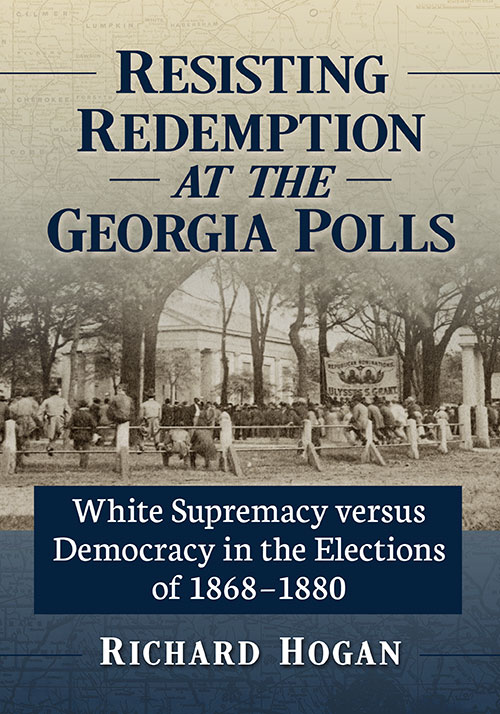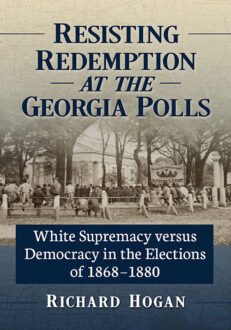Resisting Redemption at the Georgia Polls
White Supremacy versus Democracy in the Elections of 1868–1880
$75.00
In stock
About the Book
After the Civil War, as Black freedmen prepared to exercise their new voting rights in Georgia, white supremacist groups rose to restrict their ability. Georgians faced a new prospect for brokering a class-based electoral coalition of white yeomen and Black freedmen.
The failure of Reconstruction echoes today as Georgia remains a voting rights battleground. This book details this struggle for racial justice and democracy in postwar Georgia, with an eye on issues that have persisted more than 150 years later.
About the Author(s)
Bibliographic Details
Richard Hogan
Format: softcover (7 x 10)
Pages: 204
Bibliographic Info: 100 photos, notes, bibliography, index
Copyright Date: 2024
pISBN: 978-1-4766-9208-1
eISBN: 978-1-4766-4971-9
Imprint: McFarland
Table of Contents
Preface 1
Prologue: The Struggle for Racial Justice and Democracy 9
1. Marching Toward War 13
2. Reconstructing Georgia 33
3. Darien: Black Radical Republican Central 52
4. Lexington: Heart of the Land of Cotton 78
5. Trenton: The Edge of the Yeoman Frontier 103
6. Resisting Redemption 126
Epilogue: Redeemers Still? 151
Chapter Notes 169
Bibliography 187
Index 195
Book Reviews & Awards
• “[Hogan] offers a very useful study in a compact and readable monograph, supported by numerous charts, graphs, and maps. …recommended”—Choice
•“By applying quantitative tools from the social sciences as well as traditional methodologies of historians to three distinctly different urban communities and their respective regions within pre- and post-Civil War Georgia, Richard Hogan’s masterful study reimagines Reconstruction-era politics in ways fraught with implications for modern U.S. politics and the rise of Trumpism. Most importantly, Hogan restores contingency to Radical Reconstruction’s downfall by revealing that the potential for cross-class political alliances between southern blacks and poor whites lingered well after most historians count Reconstruction as down and out. Further, he convincingly demonstrates that stereotypical attributions of Reconstruction’s reversal to Klan and vigilante terrorism obscures more than it explains. By eschewing simplistic analyses and emphasizing processes of political brokering, Hogan illuminates the agency of Georgia politicos like Joe Brown and Tunis Campbell and reveals a fascinating Georgia political mosaic and economy bound to surprise readers.”—Robert E. May, professor emeritus of history, Purdue University, author of Yuletide in Dixie: Slavery, Christmas, and Southern Memory





